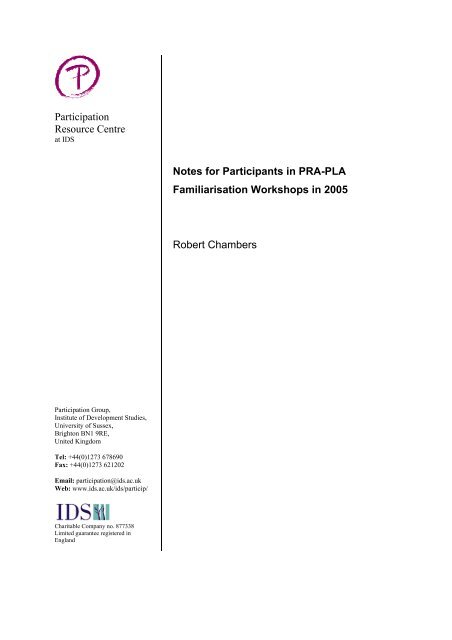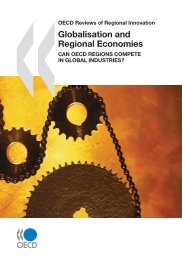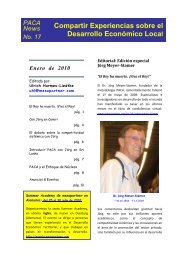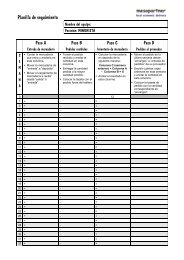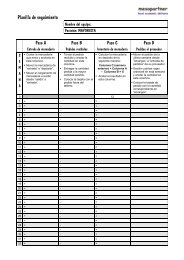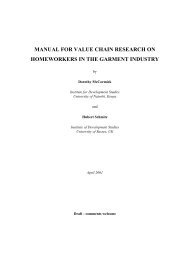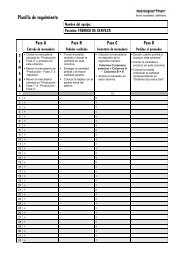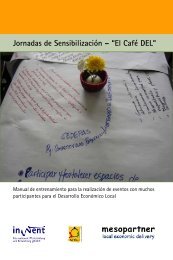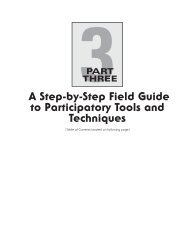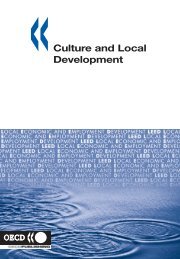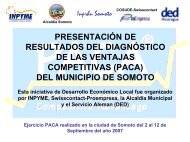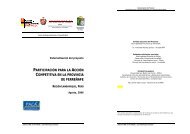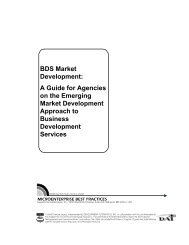R Chambers - Notes for participants in PRA-PLA course.pdf - PACA
R Chambers - Notes for participants in PRA-PLA course.pdf - PACA
R Chambers - Notes for participants in PRA-PLA course.pdf - PACA
Create successful ePaper yourself
Turn your PDF publications into a flip-book with our unique Google optimized e-Paper software.
Participation<br />
Resource Centre<br />
at IDS<br />
<strong>Notes</strong> <strong>for</strong> Participants <strong>in</strong> <strong>PRA</strong>-<strong>PLA</strong><br />
Familiarisation Workshops <strong>in</strong> 2005<br />
Robert <strong>Chambers</strong><br />
Participation Group,<br />
Institute of Development Studies,<br />
University of Sussex,<br />
Brighton BN1 9RE,<br />
United K<strong>in</strong>gdom<br />
Tel: +44(0)1273 678690<br />
Fax: +44(0)1273 621202<br />
Email: participation@ids.ac.uk<br />
Web: www.ids.ac.uk/ids/particip/<br />
Charitable Company no. 877338<br />
Limited guarantee registered <strong>in</strong><br />
England
2<br />
Pranotes05.doc available at http://www.ids.ac.uk/ids/particip/<strong>in</strong><strong>for</strong>mation/<br />
<strong>Notes</strong> <strong>for</strong> Participants <strong>in</strong> Whose Reality Counts? very short<br />
(1-2 day) <strong>PRA</strong>/<strong>PLA</strong>-related Familiarisation Workshops <strong>in</strong> 2005<br />
DISCLAIMER AND WARNING <strong>for</strong> short workshops. This sort of workshop is<br />
NOT repeat NOT repeat NOT a <strong>PRA</strong>/<strong>PLA</strong> tra<strong>in</strong><strong>in</strong>g. At best it is just a taste. There<br />
is no substitute <strong>for</strong> longer tra<strong>in</strong><strong>in</strong>g and exposure which <strong>in</strong>cludes field experience.<br />
These notes are an updated foundation which has been revised every six<br />
months or so over the past 15 years. Head<strong>in</strong>gs later <strong>in</strong> this note <strong>in</strong>dicate some<br />
of the range of the subject, <strong>in</strong>clud<strong>in</strong>g some of the many methods. These are<br />
more an a la carte menu than a syllabus! I hope these notes are of some use, if<br />
only as a source of checklists <strong>for</strong> occasional reference. You won't want to<br />
read all of this. Some of the more important po<strong>in</strong>ts are repeated. You are<br />
welcome to reproduce, translate or b<strong>in</strong> anyth<strong>in</strong>g that follows, but please<br />
remember that I have often been wrong <strong>in</strong> the past and will surely prove to be<br />
wrong about some of the th<strong>in</strong>gs said here.<br />
See also Pathways to Participation: Critical Reflections on <strong>PRA</strong>, and Inclusive Aid: power and<br />
relationships <strong>in</strong> <strong>in</strong>ternational development <strong>in</strong> sources at the end, and<br />
http://www.ids.ac.uk/ids/particip <strong>for</strong> other sources on participation and development. The postscript<br />
has a list<strong>in</strong>g of changes over the past five or so years, issues rema<strong>in</strong><strong>in</strong>g critical, and some<br />
opportunities and frontiers <strong>for</strong> 2005-2010.<br />
I th<strong>in</strong>k we are lucky, and that 2005 is a brilliantly excit<strong>in</strong>g time to be alive and<br />
work<strong>in</strong>g as development professionals. So much is chang<strong>in</strong>g, and chang<strong>in</strong>g so fast,<br />
and new potentials are cont<strong>in</strong>ually open<strong>in</strong>g up. If we are to do well this means<br />
massive and radical learn<strong>in</strong>g and unlearn<strong>in</strong>g. It means personal, professional and<br />
<strong>in</strong>stitutional change as a way of life. For some this is a threat; <strong>for</strong> others a wonderful<br />
and exhilarat<strong>in</strong>g challenge open<strong>in</strong>g up new worlds of experience.<br />
Participatory methodologies - approaches, methods and attitudes, behaviours and<br />
relationships [I have added relationships <strong>in</strong> this 2005 version] - are one part of this.<br />
With those known as <strong>PRA</strong> and <strong>PLA</strong> th<strong>in</strong>gs have been mov<strong>in</strong>g fast. Alas, a lot of<br />
activities labelled as <strong>PRA</strong> and <strong>PLA</strong> have been rout<strong>in</strong>ised and wooden, and exploit and<br />
disillusion poor people who participate. In contrast, good <strong>PRA</strong>/<strong>PLA</strong> activities<br />
empower. They are different each time. They improvise and <strong>in</strong>novate. They fit our<br />
world of accelerat<strong>in</strong>g change. It is not easy to keep up-to-date. I keep on hav<strong>in</strong>g to<br />
revise these notes, and do it sometimes twice a year. If you see them and they are<br />
more than six months old, please remember that. Much may have changed. And<br />
anyway I am beh<strong>in</strong>d the game. It is reflective practitioners <strong>in</strong> the field who are<br />
mak<strong>in</strong>g the runn<strong>in</strong>g and from whom those of us not <strong>in</strong> the field have cont<strong>in</strong>uously to<br />
learn.<br />
What are RRA, <strong>PRA</strong> and <strong>PLA</strong>?<br />
RRA orig<strong>in</strong>ally stood <strong>for</strong> Rapid Rural Appraisal, but its approach and methods are<br />
also used <strong>in</strong> urban and other contexts. “Relaxed” is better than “Rapid”.<br />
<strong>PRA</strong> orig<strong>in</strong>ally stood <strong>for</strong> Participatory Rural Appraisal, but its applications are <strong>in</strong><br />
many, many contexts besides rural, and good practice is far more than just appraisal.
3<br />
<strong>PLA</strong> stands <strong>for</strong> Participatory Learn<strong>in</strong>g and Action. As a term it is often used<br />
<strong>in</strong>terchangeably with <strong>PRA</strong>.<br />
Perhaps each of us should give our own answers to what <strong>PRA</strong> or <strong>PLA</strong> is or should be.<br />
"Use your own best judgement at all times" is one part of the core of what <strong>PRA</strong>/<strong>PLA</strong><br />
has become. It cont<strong>in</strong>ues to evolve and spread so fast that no def<strong>in</strong>ition can or should<br />
be f<strong>in</strong>al. An older description could be updated to read that it is:<br />
a grow<strong>in</strong>g family of approaches, methods, attitudes and behaviours to enable<br />
and empower people to share, analyse and enhance their knowledge of life and<br />
conditions, and to plan, act, monitor, evaluate and reflect". (Emphasis <strong>for</strong><br />
additions)<br />
Many make a dist<strong>in</strong>ction between RRA and <strong>PRA</strong>/<strong>PLA</strong>. For them, RRA is about<br />
f<strong>in</strong>d<strong>in</strong>g out. It is data collect<strong>in</strong>g, with the analysis done ma<strong>in</strong>ly by “us”. Good<br />
<strong>PRA</strong>/<strong>PLA</strong>, which evolved out of RRA, is <strong>in</strong> contrast empower<strong>in</strong>g, a process of<br />
appraisal, analysis and action by local people themselves. There are methods which<br />
are typically RRA methods (observation, semi-structured <strong>in</strong>terviews, transects etc)<br />
and others which are typically <strong>PRA</strong>/<strong>PLA</strong> methods (participatory mapp<strong>in</strong>g,<br />
diagramm<strong>in</strong>g, us<strong>in</strong>g the ground <strong>in</strong> various ways, mak<strong>in</strong>g comparisons etc, often <strong>in</strong><br />
small groups). <strong>PRA</strong>/<strong>PLA</strong> methods can be used <strong>in</strong> an RRA (data collect<strong>in</strong>g or<br />
extractive) mode (but see cautions below), and RRA methods can be used <strong>in</strong> a<br />
<strong>PRA</strong>/<strong>PLA</strong> (empower<strong>in</strong>g) mode.<br />
Labels are a problem but we seem to be stuck with them. For <strong>PRA</strong> "appraisal" is<br />
hopelessly <strong>in</strong>appropriate now. Good <strong>PRA</strong> is a process, not a one-off event. It<br />
<strong>in</strong>volves much more than just appraisal. The ma<strong>in</strong> publication RRA <strong>Notes</strong> (numbers<br />
1-21) (1988 onwards) was renamed <strong>PLA</strong> (Participatory Learn<strong>in</strong>g and Action) <strong>Notes</strong><br />
(numbers 22-49) and is now Participatory Learn<strong>in</strong>g and Action (number 50 - ) <strong>for</strong><br />
<strong>in</strong><strong>for</strong>mation and copies try www.earthpr<strong>in</strong>t.com or www.iied.org]. Participatory learn<strong>in</strong>g<br />
and action is what many practitioners of <strong>PRA</strong> believe <strong>in</strong> and are do<strong>in</strong>g, but <strong>PRA</strong> is<br />
still the label many use. In Pakistan <strong>PRA</strong> now stands <strong>for</strong> Participation-Reflection-<br />
Action. Garett Pratt’s (January 2001) Practitioners’ Critical Reflections on <strong>PRA</strong> and<br />
Participation <strong>in</strong> Nepal (IDS Work<strong>in</strong>g Paper 122, on the IDS website) ends with a<br />
practitioner’s suggestion “I believe that <strong>PRA</strong> gives a better mean<strong>in</strong>g when we say<br />
participatory reflection and action…That is really what we have to do”. At its core<br />
many now see critical self-awareness, personal behaviour and attitudes, particpatory<br />
relationships, and engagement with action.<br />
Some of the best facilitators and practitioners have moved beyond any limited sense<br />
of <strong>PRA</strong> to embrace methodological pluralism. They talk of and use “participatory<br />
methodologies”. There are many of these such as popular theatre, Reflect<br />
(Regenerated Freirian Literacy through Empower<strong>in</strong>g Community Techniques),<br />
Plann<strong>in</strong>g <strong>for</strong> Real, Stepp<strong>in</strong>g Stones, Appreciative Inquiry, Tra<strong>in</strong><strong>in</strong>g <strong>for</strong><br />
Trans<strong>for</strong>mation, and STAR. They can be comb<strong>in</strong>ed and are evolv<strong>in</strong>g <strong>in</strong> <strong>in</strong>numerable<br />
ways. Between them all there can be “shar<strong>in</strong>g without boundaries”.<br />
So good <strong>PRA</strong> is about empower<strong>in</strong>g. It is l<strong>in</strong>ked with dist<strong>in</strong>ctive behaviours, attitudes,<br />
approaches and relationships. "We" are not teachers or transferors of technology, but<br />
<strong>in</strong>stead convenors, catalysts, and facilitators. We have to unlearn, and put our
4<br />
knowledge, ideas and categories <strong>in</strong> second place. Our role is to enable others to do<br />
their own appraisal, analysis, presentations, plann<strong>in</strong>g and action, to own the outcome,<br />
and to teach us, shar<strong>in</strong>g their knowledge. The “others” may be local rural or urban<br />
people, women, men, children or old people, or members of an organisation or group.<br />
They are often those who are weak, marg<strong>in</strong>alised, vulnerable and voiceless. They then<br />
do many of the th<strong>in</strong>gs we tend to th<strong>in</strong>k only we can do. “They can do it” means that<br />
we have confidence <strong>in</strong> their capabilities. We “hand over the stick” and facilitate their<br />
mapp<strong>in</strong>g, diagramm<strong>in</strong>g, list<strong>in</strong>g, sort<strong>in</strong>g, sequenc<strong>in</strong>g, count<strong>in</strong>g, estimat<strong>in</strong>g, scor<strong>in</strong>g,<br />
rank<strong>in</strong>g, l<strong>in</strong>k<strong>in</strong>g, analys<strong>in</strong>g, plann<strong>in</strong>g, monitor<strong>in</strong>g and evaluat<strong>in</strong>g. Many practitioners<br />
and tra<strong>in</strong>ers consider the term <strong>PRA</strong> should only be used <strong>for</strong> processes which<br />
empower.<br />
Three common elements found <strong>in</strong> a <strong>PRA</strong> approach are:<br />
* critical self-aware responsibility. Individual responsibility and judgement<br />
exercised by facilitators, with self-critical awareness, embrac<strong>in</strong>g error.<br />
* equity and empowerment. A commitment to equity. empower<strong>in</strong>g those<br />
who are marg<strong>in</strong>alised, excluded, and deprived, often especially women.<br />
* diversity. Recognition and celebration of diversity<br />
You can add to this list, yourself us<strong>in</strong>g your own best judgement. <strong>PRA</strong> and <strong>PLA</strong> are<br />
not fixed th<strong>in</strong>gs. Some who have been practis<strong>in</strong>g it <strong>for</strong> some time say that they<br />
experience it as a self-critical philosophy, a way of life, a way of be<strong>in</strong>g and of relat<strong>in</strong>g<br />
to others.<br />
But this is gett<strong>in</strong>g a bit heavy. The best th<strong>in</strong>g to do is to <strong>in</strong>vent, evolve and experience<br />
this th<strong>in</strong>g <strong>for</strong> yourself. If you wish. Mak<strong>in</strong>g mistakes and learn<strong>in</strong>g and chang<strong>in</strong>g all<br />
the time.<br />
Orig<strong>in</strong>s<br />
Some of the methods come from social anthropology. Some, especially diagramm<strong>in</strong>g,<br />
were developed and spread <strong>in</strong> Southeast Asia, as part of agroecosystem analysis,<br />
orig<strong>in</strong>at<strong>in</strong>g <strong>in</strong> the University of Chiang Mai <strong>in</strong> 1978 with the work of Gordon Conway<br />
and his colleagues. For RRA, the University of Khon Kaen <strong>in</strong> Thailand was a major<br />
source of <strong>in</strong>novation and <strong>in</strong>spiration <strong>in</strong> the 1980s. Other methods, like matrix scor<strong>in</strong>g,<br />
seem to have been new <strong>in</strong> the early 1990s. What is also new is the way they have all<br />
come together, and the way RRA, <strong>PRA</strong> and <strong>PLA</strong> seem to know no boundaries of<br />
discipl<strong>in</strong>e, geography or culture. The term <strong>PRA</strong> was used early on <strong>in</strong> Kenya and India<br />
around 1988 and 1989. Some of the early <strong>PRA</strong> <strong>in</strong> Kenya was l<strong>in</strong>ked with the<br />
production of Village Resource Management Plans, and some with Rapid Catchment<br />
Analysis. In India and Nepal from 1989 onwards there was an accelerated<br />
development and spread of <strong>PRA</strong> with many <strong>in</strong>novations and applications (see<br />
especially RRA <strong>Notes</strong> 13). Parallel developments took place <strong>in</strong> other countries<br />
around the world, with lateral shar<strong>in</strong>g and an explosion of creativity and diversity.
5<br />
Spread<br />
S<strong>in</strong>ce around1990 <strong>PRA</strong>/<strong>PLA</strong> has expanded and spread:<br />
• from appraisal and analysis to plann<strong>in</strong>g, action and M and E<br />
• from rural to urban<br />
• from field applications to applications <strong>in</strong> organisations<br />
• from a few sectors and doma<strong>in</strong>s to many<br />
• from “safe” to sensitive, difficult and dangerous topics<br />
• from NGOs to Government Departments and Universities<br />
• from a few countries to many<br />
• from South to North<br />
• from methods to professional and <strong>in</strong>stitutional change<br />
• from behaviour and attitudes to personal change and relationships<br />
• from action to policy <strong>in</strong>fluence<br />
• from practice to theory (ask<strong>in</strong>g - why does it work?)<br />
Learn<strong>in</strong>g experience workshops <strong>for</strong> <strong>PRA</strong>/<strong>PLA</strong> have been convened <strong>in</strong> many places<br />
and countries now. In the 1990s <strong>in</strong>ternational South-South <strong>PRA</strong> Exchange Workshops<br />
were held <strong>in</strong> Gu<strong>in</strong>ea-Bissau, India (numerous), Jordan, Kenya, Mexico, Nepal<br />
(several), Pakistan, the Philipp<strong>in</strong>es, Senegal, Sri Lanka, and Zimbabwe. There were<br />
hundreds of cases of shar<strong>in</strong>g where tra<strong>in</strong>ers went South-South from one country or<br />
cont<strong>in</strong>ent to another to conduct <strong>PRA</strong> tra<strong>in</strong><strong>in</strong>g.<br />
The spirit of <strong>in</strong>ventiveness and improvisation (l<strong>in</strong>ked with optimal unpreparedness)<br />
which is part of <strong>PRA</strong> cont<strong>in</strong>ues to spread and help people <strong>in</strong> different parts of the<br />
world to feel liberated and able to develop their own varieties of approach and<br />
method. People (both local and outsiders), once they have unfrozen and established<br />
rapport, enjoy improvis<strong>in</strong>g, vary<strong>in</strong>g and <strong>in</strong>vent<strong>in</strong>g methods and apply<strong>in</strong>g them as part<br />
of participatory processes. Much creativity has been shown by fieldworkers, and by<br />
local people with whom they have been <strong>in</strong>teract<strong>in</strong>g. <strong>PRA</strong>/<strong>PLA</strong> activities are often<br />
engross<strong>in</strong>g, popular and powerful.<br />
In some countries and regions, the use of <strong>PRA</strong>/<strong>PLA</strong> has become normal: parts of<br />
Nepal and some Districts <strong>in</strong> Tanzania, <strong>for</strong> example. National networks have been<br />
established <strong>in</strong> all cont<strong>in</strong>ents. The countries and regions where there is activity or<br />
where the Participation Group <strong>in</strong> IDS can give you contacts (those underl<strong>in</strong>ed are<br />
known or believed to have active <strong>PRA</strong>-related networks) used to, and may still,<br />
<strong>in</strong>clude<br />
Afghanistan, Albania, Angola, Argent<strong>in</strong>a, Armenia, Australia, Bangladesh, Belize,<br />
Bhutan, Bolivia, Bosnia, Botswana, Brazil, Bulgaria, Burk<strong>in</strong>a Faso, Cambodia,<br />
Cameroon, Canada, Cap Verde, Chile, Ch<strong>in</strong>a, Colombia, Costa Rica, Denmark,<br />
Ecuador, Egypt, El Salvador, Eritrea, Ethiopia, F<strong>in</strong>land, Fiji/South Pacific, the<br />
Gambia, Germany, Ghana, Guatemala, Gu<strong>in</strong>ea, Gu<strong>in</strong>ea-Bissau, Honduras, India,<br />
Indonesia, Iran, Ireland, Japan, Jordan, Kazakhstan, Kenya, Kyrgyzstan, Lao PDR,<br />
Lebanon, Lesotho, Malawi, Malaysia, Mali, Mauritania, Mexico, Mongolia, Morocco,<br />
Mozambique, Myanmar, Namibia, Nepal, New Zealand, Niger, Nigeria, Norway,<br />
Pakistan, Palest<strong>in</strong>e, Panama, Papua New Gu<strong>in</strong>ea, Paraguay, Peru, the Philipp<strong>in</strong>es,<br />
Russia, Rwanda, Senegal, Sierra Leone, Somaliland, South Africa, Sri Lanka, Sudan,
6<br />
Sweden, Switzerland, Tadjikistan, Tanzania, Thailand, Tibet, Turkey, Uganda, UK,<br />
Uruguay, Uzbekistan, Venezuela, Vietnam, Yemen, Zambia and Zimbabwe .<br />
Elsewhere there must be much tak<strong>in</strong>g place which we do not know about.<br />
The approaches, methods and behaviours have proved applicable <strong>in</strong> many types of<br />
organisations. People <strong>in</strong> NGOs were the first ma<strong>in</strong> pioneers of <strong>PRA</strong> but many<br />
Government field organisations, tra<strong>in</strong><strong>in</strong>g <strong>in</strong>stitutes, and universities are now us<strong>in</strong>g and<br />
evolv<strong>in</strong>g variants of <strong>PRA</strong>/<strong>PLA</strong>. All or almost all major fund<strong>in</strong>g (donor and lender)<br />
organisations and INGOs have promoted, supported, and/or been challenged by, <strong>PRA</strong>.<br />
Applications are many <strong>in</strong>clud<strong>in</strong>g community- level (urban as well as rural) plann<strong>in</strong>g,<br />
women's programmes, client ("stakeholder") selection and deselection, health<br />
programmes, and adult empowerment and literacy (REFLECT) [<strong>for</strong> others see below].<br />
Policy applications through PPAs (participatory poverty assessments) have become<br />
common, and can be part of PRSPs (poverty reduction strategy papers, <strong>in</strong> heavily<br />
<strong>in</strong>debted countries). Tra<strong>in</strong><strong>in</strong>g <strong>in</strong>stitutes have adopted and adapted <strong>PRA</strong>/<strong>PLA</strong> <strong>for</strong> the<br />
fieldwork and field experience of their probationers and students. Many university<br />
faculty have been slow to learn, but pressure from students has been successful and<br />
<strong>PRA</strong>/<strong>PLA</strong> approaches are now be<strong>in</strong>g “taught” <strong>in</strong> universities. <strong>PRA</strong>/<strong>PLA</strong> methods are<br />
now widely used <strong>in</strong> research and have been used as alternatives to questionnaires to<br />
generate statistics.<br />
Concerns<br />
There has been a mass of bad practice (as well as a lot that is brilliant). Quality<br />
assurance has been a concern among practitioners and tra<strong>in</strong>ers throughout the 1990s<br />
and s<strong>in</strong>ce. Dangers and abuses have <strong>in</strong>cluded:<br />
• us<strong>in</strong>g the label without the substance!<br />
• fail<strong>in</strong>g to put behaviour and attitudes be<strong>for</strong>e methods!!<br />
• rush<strong>in</strong>g and dom<strong>in</strong>at<strong>in</strong>g <strong>in</strong> the field!!!<br />
• fund<strong>in</strong>g agencies’ demands <strong>for</strong> tra<strong>in</strong><strong>in</strong>g <strong>in</strong> a day or two, with lectur<strong>in</strong>g,<br />
without fieldwork, and then implementation <strong>in</strong> communities as a oneoff<br />
<strong>in</strong> a short time!!!!<br />
• fund<strong>in</strong>g agencies and governments demand<strong>in</strong>g <strong>in</strong>stant <strong>PRA</strong> on a large<br />
scale!!!!!!<br />
The labels "RRA", "<strong>PRA</strong>" and “<strong>PLA</strong>” have been used to justify and legitimate sloppy,<br />
biased, rushed and unself-critical work. Any approach or methods can be used badly,<br />
and RRA, <strong>PRA</strong> and <strong>PLA</strong> provide some excruciat<strong>in</strong>g examples of bad practice, usually<br />
driven by lender and donor agencies whose staff do not know what they are do<strong>in</strong>g.<br />
Abuses have been many: employ<strong>in</strong>g consultant tra<strong>in</strong>ers who are prepared to “tra<strong>in</strong>” <strong>in</strong><br />
a day or two; rigid, rout<strong>in</strong>ised applications; rush<strong>in</strong>g and dom<strong>in</strong>at<strong>in</strong>g <strong>in</strong> the field;<br />
community meet<strong>in</strong>gs dom<strong>in</strong>ated by big talkers, men and the local elite; tak<strong>in</strong>g local<br />
people's time without recompense; shopp<strong>in</strong>g lists of requests from communities;<br />
rais<strong>in</strong>g expectations which are not fulfilled; and rapid, disbursement-driven<br />
programmes seek<strong>in</strong>g to spend fast, creat<strong>in</strong>g dependence, and underm<strong>in</strong><strong>in</strong>g longer-term<br />
more susta<strong>in</strong>able ef<strong>for</strong>ts <strong>in</strong> other communities.<br />
Part of the problem is that fund<strong>in</strong>g agencies and Governments tend to want to go<br />
<strong>in</strong>stantly to scale, <strong>in</strong> hundreds, even thousands, of communities. So far I do not th<strong>in</strong>k<br />
any way has been found to do this both quickly and well, though there are promis<strong>in</strong>g<br />
developments <strong>in</strong> Rwanda with a community-based PPA and <strong>in</strong> Bangladesh with
7<br />
Community-Led Total Sanitation (see Kar reference). Typically, demand <strong>for</strong> tra<strong>in</strong><strong>in</strong>g<br />
exceeds the supply of good tra<strong>in</strong>ers. <strong>PRA</strong> tra<strong>in</strong>ers who have really "got it" number<br />
hundreds if not thousands worldwide now. But all too often they have to sacrifice<br />
their livelihoods <strong>in</strong> order to resist the outrageous demands of some fund<strong>in</strong>g agencies.<br />
<strong>PRA</strong> has also become a fashionable label, with "expert" consultants say<strong>in</strong>g they can<br />
provide <strong>PRA</strong> and <strong>PRA</strong> <strong>in</strong> however short a time. There used to be a prejudice among<br />
some fund<strong>in</strong>g agencies that tra<strong>in</strong>ers had to be recruited <strong>in</strong> the North, but that is now<br />
pretty well a th<strong>in</strong>g of the past. <strong>PRA</strong> was developed <strong>in</strong> the South and most of the good<br />
tra<strong>in</strong>ers are <strong>in</strong> and from the South. And they <strong>in</strong>sist on tra<strong>in</strong><strong>in</strong>g <strong>in</strong> the field, and on<br />
plenty of time <strong>for</strong> it. Any lender or donor who demands <strong>PRA</strong> and does not make<br />
provide <strong>for</strong> this has a lot to answer <strong>for</strong>.<br />
Fund<strong>in</strong>g agencies and Government Departments, and even NGOs, rarely recognise<br />
that they themselves need <strong>in</strong>stitutional changes - of cultures, procedures and rewards<br />
– if they are to promote and susta<strong>in</strong> good participation and good <strong>PRA</strong>. We are<br />
learn<strong>in</strong>g what those necessary changes are. It is no good preach<strong>in</strong>g participation at<br />
the grass roots while ma<strong>in</strong>ta<strong>in</strong><strong>in</strong>g an authoritarian hierarchy "above", with fund<strong>in</strong>g<br />
agency or department-driven targets, punitive management, control-oriented<br />
managers, and the like. When it comes to promot<strong>in</strong>g participation, large bureaucracies<br />
with pressures to disburse are deeply disabled. We need therapies <strong>for</strong> their<br />
rehabilitation.<br />
The scale of good <strong>PRA</strong> is <strong>in</strong>creas<strong>in</strong>g. But there is far, far, still to go.<br />
Start<strong>in</strong>g, and go<strong>in</strong>g where?<br />
Some people whose attitudes are truly participatory can, with a m<strong>in</strong>imum of exposure,<br />
simply go ahead and learn as they go. The short paper "Start, stumble, self-correct,<br />
share" which I will hand out encourages such people to start, recognis<strong>in</strong>g that much<br />
depends on our personal behaviour and attitudes, and that we all make mistakes. The<br />
behaviour and attitudes required of us as "uppers" (outsiders, professionals, people<br />
who tend to dom<strong>in</strong>ate) <strong>in</strong>clude: critical self-awareness and embrac<strong>in</strong>g error; sitt<strong>in</strong>g<br />
down, listen<strong>in</strong>g and learn<strong>in</strong>g; not lectur<strong>in</strong>g but "hand<strong>in</strong>g over the stick" to "lowers"<br />
(people who are local, less educated, younger, marg<strong>in</strong>alised, usually dom<strong>in</strong>ated) who<br />
become the analysts and ma<strong>in</strong> teachers; hav<strong>in</strong>g confidence that "they can do it"; and a<br />
relaxed and open-ended <strong>in</strong>ventiveness.<br />
Much <strong>PRA</strong> is enjoyed, both by local <strong>participants</strong> and by outsiders who <strong>in</strong>itiate it. The<br />
word "fun" has entered the vocabulary and describes some of the experience. But<br />
some people with a strong discipl<strong>in</strong>ary tra<strong>in</strong><strong>in</strong>g f<strong>in</strong>d the reversal of teach<strong>in</strong>g and<br />
learn<strong>in</strong>g difficult. It is not their fault. We can help one another firmly but<br />
sympathetically. And we can amiably tease one another when we slip <strong>in</strong>to "hold<strong>in</strong>g<br />
the stick"; as of <strong>course</strong> I shall do!<br />
Where does all this lead? How crucial is it that "lowers" should conduct their own<br />
<strong>in</strong>vestigations and analysis? Does <strong>PRA</strong> provide a strategy <strong>for</strong> local empowerment and<br />
susta<strong>in</strong>able development? What happens when it goes to scale? Can self-critical<br />
awareness be part of the genes of <strong>PRA</strong>, so that it is self-improv<strong>in</strong>g as it spreads?<br />
These are questions you may wish to reflect on <strong>for</strong> yourself. For many now they are<br />
be<strong>in</strong>g answered by shar<strong>in</strong>g experience. To present background, and <strong>in</strong> search of<br />
understand<strong>in</strong>g and answers, here are some head<strong>in</strong>gs and notes. But write your own.....
8<br />
Why did Rapid Rural Appraisal (RRA) evolve <strong>for</strong> data collection (<strong>in</strong> the late<br />
1970s and 1980s)? [this section dates back to the early 1990s]<br />
• Accelerat<strong>in</strong>g rural change, and the need <strong>for</strong> good and timely <strong>in</strong><strong>for</strong>mation<br />
and <strong>in</strong>sights<br />
• Recognis<strong>in</strong>g "us" and our confidence <strong>in</strong> our knowledge as much of the<br />
problem, and "them" and their knowledge as much of the solution<br />
• The anti-poverty biases (spatial, project, person, seasonal...) of rural<br />
development tourism. Be<strong>in</strong>g rapid and wrong<br />
• The <strong>in</strong>sulation, isolation and out-of-date experience of senior and powerful<br />
people, most of them men<br />
• Survey slavery - questionnaire surveys which took long, misled, were<br />
wasteful, and were reported on, if at all, late<br />
• The search <strong>for</strong> cost-effectiveness, recognis<strong>in</strong>g trade-offs between depth,<br />
breadth, accuracy, and timel<strong>in</strong>ess, assess<strong>in</strong>g actual beneficial use of<br />
<strong>in</strong><strong>for</strong>mation aga<strong>in</strong>st costs of obta<strong>in</strong><strong>in</strong>g it<br />
What happened, lead<strong>in</strong>g to <strong>PRA</strong> <strong>for</strong> empowerment?<br />
• A confluence of approaches and methods - applied social anthropology,<br />
agroecosystem analyis, farm<strong>in</strong>g systems research, participatory action<br />
research, and RRA itself all com<strong>in</strong>g together and evolv<strong>in</strong>g...<br />
• A repertoire of new methods especially with visuals (mapp<strong>in</strong>g, matrices,<br />
diagramm<strong>in</strong>g.....) and of sequences of methods<br />
• The discovery that "they can do it" (that “lowers” have far greater<br />
capabilities than most “uppers” recognise)<br />
• The relative power and popularity of the open aga<strong>in</strong>st the closed, the visual<br />
aga<strong>in</strong>st the verbal, group aga<strong>in</strong>st <strong>in</strong>dividual analysis, and compar<strong>in</strong>g<br />
aga<strong>in</strong>st measur<strong>in</strong>g<br />
• The search <strong>for</strong> practical approaches and methods <strong>for</strong> decentralisation,<br />
democracy, diversity, susta<strong>in</strong>ability, community participation,<br />
empowerment....<br />
Pr<strong>in</strong>ciples shared by RRA and <strong>PRA</strong><br />
• offsett<strong>in</strong>g biases (spatial, project, person - gender, elite etc, seasonal,<br />
professional, courtesy..)<br />
• rapid progressive learn<strong>in</strong>g - flexible, exploratory, <strong>in</strong>teractive, <strong>in</strong>ventive<br />
• reversals - learn<strong>in</strong>g from, with and by local people, elicit<strong>in</strong>g and<br />
us<strong>in</strong>g their criteria and categories<br />
• optimal ignorance, and appropriate imprecision - not f<strong>in</strong>d<strong>in</strong>g out more than<br />
is needed, not measur<strong>in</strong>g more accurately than needed, and not try<strong>in</strong>g to<br />
measure what does not need to be measured. We are tra<strong>in</strong>ed to measure<br />
th<strong>in</strong>gs, but often trends, scores or rank<strong>in</strong>g are all that are required<br />
• triangulation - us<strong>in</strong>g different methods, sources and discipl<strong>in</strong>es, and a<br />
range of <strong>in</strong><strong>for</strong>mants <strong>in</strong> a range of places, and cross-check<strong>in</strong>g to get closer<br />
to the truth through successive approximations<br />
• direct contact, face to face, <strong>in</strong> the field<br />
• seek<strong>in</strong>g diversity and differences
9<br />
Additional Pr<strong>in</strong>ciples of <strong>PRA</strong> (but develop and discover your own)<br />
<strong>PRA</strong>, as it has evolved, is all this and more. Some of the "more" is:<br />
• critical self-awareness about attitudes and behaviour; doubt; embrac<strong>in</strong>g<br />
and learn<strong>in</strong>g from error; cont<strong>in</strong>uously try<strong>in</strong>g to do better; build<strong>in</strong>g learn<strong>in</strong>g<br />
and improvement <strong>in</strong>to every experience; and tak<strong>in</strong>g personal<br />
responsibility.<br />
• chang<strong>in</strong>g behaviour and attitudes, from dom<strong>in</strong>at<strong>in</strong>g to facilitat<strong>in</strong>g, ga<strong>in</strong><strong>in</strong>g<br />
rapport, ask<strong>in</strong>g people, often “lowers”, to teach us, respect<strong>in</strong>g them,<br />
hav<strong>in</strong>g confidence that they can do it, hand<strong>in</strong>g over the stick, empower<strong>in</strong>g<br />
and enabl<strong>in</strong>g them to conduct their own analysis<br />
• a culture of shar<strong>in</strong>g - of <strong>in</strong><strong>for</strong>mation, of methods, of food, of field<br />
experiences (between NGOs, Government and local people)....<br />
• commitment to equity, empower<strong>in</strong>g those who are marg<strong>in</strong>alized, deprived,<br />
excluded and regarded as not capable, often especially women, children<br />
and those who are poorer.<br />
The Primacy of Behaviour and Attitudes<br />
Behaviour and attitudes are more important than methods.<br />
In facilitat<strong>in</strong>g <strong>PRA</strong> there are many traps:<br />
• rush<strong>in</strong>g (rapid and wrong aga<strong>in</strong>)<br />
• lectur<strong>in</strong>g <strong>in</strong>stead of listen<strong>in</strong>g, watch<strong>in</strong>g and learn<strong>in</strong>g. Is this problem<br />
worse with men than women, worse with older men than younger, and<br />
worst of all with those who have retired? Who holds the stick? Who wags<br />
the f<strong>in</strong>ger? Who teaches? Who listens? Who learns? (The ERR, which I<br />
will expla<strong>in</strong>, is relevant here)<br />
• <strong>in</strong>terrupt<strong>in</strong>g and <strong>in</strong>terview<strong>in</strong>g people, and suggest<strong>in</strong>g th<strong>in</strong>gs to them, when<br />
they are try<strong>in</strong>g to concentrate on mapp<strong>in</strong>g, rank<strong>in</strong>g, scor<strong>in</strong>g, or<br />
diagramm<strong>in</strong>g...Learn<strong>in</strong>g not to <strong>in</strong>terview is not easy<br />
• impos<strong>in</strong>g "our" ideas, categories, values, without realis<strong>in</strong>g we are do<strong>in</strong>g it,<br />
mak<strong>in</strong>g it difficult to learn from "them", and mak<strong>in</strong>g "them" appear<br />
ignorant when they are not<br />
• gender biases with male teams and neglect of women (aga<strong>in</strong> and aga<strong>in</strong> and<br />
aga<strong>in</strong> and aga<strong>in</strong> and aga<strong>in</strong> and...). What are the proportions of women and<br />
men among us here?<br />
• rush<strong>in</strong>g, lectur<strong>in</strong>g and <strong>in</strong>terrupt<strong>in</strong>g <strong>in</strong>stead of listen<strong>in</strong>g, watch<strong>in</strong>g and<br />
learn<strong>in</strong>g. Forgive me, but it needs repeat<strong>in</strong>g. This can be a personal<br />
problem which we do not recognise <strong>in</strong> ourselves. (It is a problem <strong>for</strong> me,<br />
as you will discover). It is best treated as a joke, and po<strong>in</strong>ted out to each<br />
other when we err. Which we all do.
10<br />
Other recurrent problems are:<br />
• people reluctant to spend time <strong>in</strong> the field or to stay overnight <strong>in</strong> villages<br />
• consultants who claim expertise but do not give primacy to behaviour and<br />
attitudes<br />
• large-scale implementation of "<strong>PRA</strong>" <strong>in</strong> a bluepr<strong>in</strong>t mode, demanded by<br />
fund<strong>in</strong>g agencies and Governments, rout<strong>in</strong>ised, top-down, with no changes<br />
<strong>in</strong> behaviour and attitudes. Instructions to all <strong>in</strong> an organisation that they<br />
will immediately "use <strong>PRA</strong>". Rapid unself-critical adoption lead<strong>in</strong>g to<br />
poor outcomes, and discredit<strong>in</strong>g <strong>PRA</strong>.<br />
(See also "Participatory Methods and Approaches: shar<strong>in</strong>g our concerns and look<strong>in</strong>g<br />
to the future" <strong>in</strong> <strong>PLA</strong> <strong>Notes</strong> 22; the Bangalore Statement - "Shar<strong>in</strong>g Our Experience:<br />
An appeal to governments and donors" (July 1996); and the Calcutta Statement<br />
"Go<strong>in</strong>g to Scale with <strong>PRA</strong>: Reflections and Recommendations" (May 1997). A good<br />
source on behaviour and attitudes is: Somesh Kumar ed. ABC (Attitude and<br />
Behaviour Change of <strong>PRA</strong>), available on request from Jane Stevens, IDS Sussex (or<br />
from <strong>PRA</strong>XIS, 12 Patliputra Colony, Patna 800 013, Bihar, India)<br />
Approaches and Methods<br />
"Approach" is basic. If attitudes are wrong, many of these methods will not work as<br />
well as they should. Where attitudes are right and rapport is good, it is often<br />
surpris<strong>in</strong>g what local people show they know, and what they can do.<br />
<strong>PRA</strong> entails shifts of emphasis from:<br />
dom<strong>in</strong>at<strong>in</strong>g to empower<strong>in</strong>g<br />
closed to open<br />
<strong>in</strong>dividual to group<br />
verbal to visual<br />
measur<strong>in</strong>g to compar<strong>in</strong>g, rank<strong>in</strong>g and scor<strong>in</strong>g<br />
and of experience (when th<strong>in</strong>gs go well) from<br />
reserve to rapport<br />
frustration to fun<br />
Don't be put off by the length of the list that follows. The purpose is to show that the<br />
menu is varied. There is much to try out and explore, and much to <strong>in</strong>vent <strong>for</strong> yourself<br />
and to encourage local people to <strong>in</strong>vent.<br />
You may already have used some of these approaches and methods. Some are pla<strong>in</strong><br />
commonsense and common practice. Others are <strong>in</strong>genious and not obvious. Some<br />
are quite simple to do. Others less so. You can anyway <strong>in</strong>vent your own variants,<br />
<strong>in</strong>teract<strong>in</strong>g with local people. The first n<strong>in</strong>e come especially from the RRA tradition:
11<br />
Some Approaches and Methods more Typical of RRA (but relevant <strong>for</strong><br />
<strong>PRA</strong>/<strong>PLA</strong> too)<br />
♦ offset the anti-poverty biases of rural development tourism (spatial, project,<br />
person, seasonal, courtesy...)<br />
♦ f<strong>in</strong>d and review secondary data. They can mislead. They can also help a lot. At<br />
present, <strong>for</strong> the sake of a new balance, and of "our" reorientation and "their"<br />
participation, secondary data are not heavily stressed <strong>in</strong> <strong>PRA</strong>; but they can be very<br />
useful, especially <strong>in</strong> the earlier stages of e.g. decid<strong>in</strong>g where to go<br />
♦ observe directly (see <strong>for</strong> yourself) (It has been strik<strong>in</strong>g <strong>for</strong> me to beg<strong>in</strong> to realise<br />
how much I do not see, or do not th<strong>in</strong>k to ask about. Does education deskill us?<br />
Am I alone, or do many of us have this problem?) Comb<strong>in</strong>e observation with selfcritical<br />
awareness of personal biases that result from our specialised education and<br />
background, and consciously try to compensate <strong>for</strong> these.<br />
♦ seek out the experts. Ask: who are the experts? So obvious, and so often<br />
overlooked. Who knows most about changes <strong>in</strong> types of fuels used <strong>for</strong> cook<strong>in</strong>g?<br />
Medic<strong>in</strong>al plants? Seasonal ra<strong>in</strong>fall? Who is pregnant? Goats? Treatments <strong>for</strong><br />
diseases? Edible berries? Water supplies? Ecological history? Fodder grasses?<br />
Markets and prices? Factionalism and conflict? Chang<strong>in</strong>g values and customs?<br />
Resolv<strong>in</strong>g conflicts? The priorities of poor people (poor people), children<br />
(children)……?<br />
♦ semi-structured <strong>in</strong>terview<strong>in</strong>g. The Khon Kaen school of RRA has regarded this<br />
as the "core" of good RRA. Have a mental or written checklist, but be open to<br />
new aspects and to follow<strong>in</strong>g up on the new and unexpected<br />
♦ transect walks - systematically walk<strong>in</strong>g with key <strong>in</strong><strong>for</strong>mants through an area,<br />
observ<strong>in</strong>g, meet<strong>in</strong>g people, ask<strong>in</strong>g, listen<strong>in</strong>g, discuss<strong>in</strong>g, identify<strong>in</strong>g different<br />
zones, local technologies, <strong>in</strong>troduced technologies, seek<strong>in</strong>g problems, solutions,<br />
opportunities, and mapp<strong>in</strong>g and/or diagramm<strong>in</strong>g resources and f<strong>in</strong>d<strong>in</strong>gs.<br />
Transects can take many <strong>for</strong>ms - vertical, loop, along a water<strong>course</strong>, comb<strong>in</strong>g,<br />
even (<strong>in</strong> the Philipp<strong>in</strong>es) the sea-bottom.<br />
♦ sequences of analysis - from group to key <strong>in</strong><strong>for</strong>mant, to other <strong>in</strong><strong>for</strong>mants; or with<br />
a series of key <strong>in</strong><strong>for</strong>mants, each expert on a different stage of a process (e.g. men<br />
on plough<strong>in</strong>g, women on weed<strong>in</strong>g... etc)<br />
♦ key probes: questions which can lead direct to key issues such as - "What do you<br />
talk about when you are together?" "What new practices have you or others here<br />
experimented with <strong>in</strong> recent years?" "What happens when someone's hut burns<br />
down?"<br />
♦ case studies and stories - a household history and profile, a farm, cop<strong>in</strong>g with a<br />
crisis, how a conflict was resolved...
12<br />
Some Approaches and Methods more typical of <strong>PRA</strong> (but relevant <strong>for</strong> RRA too)<br />
♦ groups (casual or random encounter; focus or specialist; representative or<br />
structured <strong>for</strong> diversity; community/neighbourhood; or <strong>for</strong>mal). Group<br />
<strong>in</strong>teractions and analysis are often powerful and efficient, especially with mapp<strong>in</strong>g<br />
and diagramm<strong>in</strong>g when group-visual synergy occurs with cross-check<strong>in</strong>g,<br />
rem<strong>in</strong>d<strong>in</strong>g, add<strong>in</strong>g details, mutual re<strong>in</strong><strong>for</strong>cement and visible enthusiasm to “get it<br />
right”.<br />
♦ they do it, as <strong>in</strong> all <strong>PRA</strong>: local people (and lowers generally) as <strong>in</strong>vestigators and<br />
researchers - women, children, school teachers, volunteers, students, farmers,<br />
village specialists, poor people. They do transects, observe, <strong>in</strong>terview other local<br />
people. Beyond this, their own analysis, presentations, plann<strong>in</strong>g, action,<br />
monitor<strong>in</strong>g and evaluation....<br />
♦ do-it-yourself, supervised and taught by them (levell<strong>in</strong>g a field, transplant<strong>in</strong>g,<br />
weed<strong>in</strong>g, lopp<strong>in</strong>g tree fodder, collect<strong>in</strong>g common property resources, herd<strong>in</strong>g,<br />
fish<strong>in</strong>g, cutt<strong>in</strong>g and carry<strong>in</strong>g fodder grass, milk<strong>in</strong>g animals, fetch<strong>in</strong>g water,<br />
fetch<strong>in</strong>g firewood, cook<strong>in</strong>g, digg<strong>in</strong>g compost, sweep<strong>in</strong>g and clean<strong>in</strong>g, wash<strong>in</strong>g<br />
clothes, lift<strong>in</strong>g water, plaster<strong>in</strong>g a house, thatch<strong>in</strong>g, collect<strong>in</strong>g refuse...). Roles are<br />
reversed. They are the experts. We are the clumsy novices. They teach us. We<br />
learn from them. And learn their problems.<br />
♦ time l<strong>in</strong>es and trend and change analysis: chronologies of events, list<strong>in</strong>g major<br />
remembered local events with approximate dates; people's accounts of the past, of<br />
how customs, practices and th<strong>in</strong>gs close to them have changed; ethno-biographies<br />
- local histories of a crop, an animal, a tree, a pest, a weed...; diagrams, maps as<br />
matrices show<strong>in</strong>g ecological histories, changes <strong>in</strong> land use and cropp<strong>in</strong>g patterns,<br />
population, migration, fuels used, education, health, credit, the roles of women<br />
and men...; and the causes of changes and trends, <strong>in</strong> a participatory mode often<br />
with estimation of relative magnitudes<br />
♦ participatory mapp<strong>in</strong>g and modell<strong>in</strong>g: people's mapp<strong>in</strong>g, draw<strong>in</strong>g and colour<strong>in</strong>g<br />
on the ground with sticks, seeds, powders etc etc or on paper, to make social,<br />
health or demographic maps (of a residential village), resource maps or 3-D<br />
models of village lands or of <strong>for</strong>ests, maps of fields, farms, home gardens, topic<br />
maps (<strong>for</strong> water, soils, trees etc etc), mobility, service and opportunity maps, etc..<br />
These popular methods can be comb<strong>in</strong>ed with or lead <strong>in</strong>to wealth or wellbe<strong>in</strong>g<br />
rank<strong>in</strong>g, watershed plann<strong>in</strong>g, health action plann<strong>in</strong>g etc. Census mapp<strong>in</strong>g can use<br />
seeds <strong>for</strong> people, cards <strong>for</strong> households...<br />
♦ local analysis of secondary sources: For example, participatory analysis of aerial<br />
photographs (a good scale is 1:5000) to identify, share knowledge of, and analyse<br />
soil types, land conditions, land tenure etc; also satellite imagery and GIS.<br />
♦ count<strong>in</strong>g, estimates and comparisons: often us<strong>in</strong>g local measures, judgements<br />
and/or pile sort<strong>in</strong>g materials such as seeds, pellets, fruits, stones or sticks as<br />
counters or measures, sometimes comb<strong>in</strong>ed with participatory maps and models<br />
♦ seasonal calendars - distribution of days of ra<strong>in</strong>, amount of ra<strong>in</strong> or soil moisture,<br />
crops, agricultural labour, non-agricultural labour, diet, food consumption,<br />
sickness, prices, animal fodder, fuel, migration, <strong>in</strong>come, expenditure, debt etc etc<br />
♦ daily time use analysis: <strong>in</strong>dicat<strong>in</strong>g relative amounts of time, degrees of drudgery<br />
etc of activities, sometimes <strong>in</strong>dicat<strong>in</strong>g seasonal variations<br />
♦ <strong>in</strong>stitutional or "chapati"/Venn diagramm<strong>in</strong>g: identify<strong>in</strong>g <strong>in</strong>dividuals and<br />
<strong>in</strong>stitutions important <strong>in</strong> and <strong>for</strong> a community or group, or with<strong>in</strong> an organisation,<br />
and their relationships
13<br />
♦ l<strong>in</strong>kage diagrams: of flows, connections and causality. This has been used <strong>for</strong><br />
market<strong>in</strong>g, nutrient flows on farms, migration, social contacts, impacts of<br />
<strong>in</strong>terventions and trends, causes of poverty, hunger, violence etc<br />
♦ wellbe<strong>in</strong>g group<strong>in</strong>g (or wealth rank<strong>in</strong>g) - group<strong>in</strong>g or rank<strong>in</strong>g households<br />
accord<strong>in</strong>g to wellbe<strong>in</strong>g, <strong>in</strong>clud<strong>in</strong>g those considered poorest or worst off. A good<br />
lead <strong>in</strong>to discussions of the livelihoods of the poor and how they cope, and widely<br />
used <strong>for</strong> the selection of poor and deprived households with whom to work<br />
♦ matrix scor<strong>in</strong>g and rank<strong>in</strong>g, especially us<strong>in</strong>g matrices and seeds to compare<br />
through scor<strong>in</strong>g, <strong>for</strong> example different trees, or soils, or methods of soil and water<br />
conservation, varieties of a crop or animal, fields on a farm, fish, weeds,<br />
conditions at different times, and to express preferences<br />
♦ local <strong>in</strong>dicators, e.g. poor people's criteria of wellbe<strong>in</strong>g and illbe<strong>in</strong>g, and how<br />
they differ from those we assume <strong>for</strong> them. Local <strong>in</strong>dicators can be a start or<br />
basel<strong>in</strong>e <strong>for</strong> participatory M and E.<br />
♦ team contracts and <strong>in</strong>teractions - contracts drawn up by teams with agreed norms<br />
of behaviour; modes of <strong>in</strong>teraction with<strong>in</strong> teams, <strong>in</strong>clud<strong>in</strong>g chang<strong>in</strong>g pairs,<br />
even<strong>in</strong>g discussions, mutual criticism and help; how to behave <strong>in</strong> the field, etc.<br />
(The team may be outsiders only, local people only, or local people and outsiders<br />
together)<br />
♦ shared presentations and analysis, where maps, models, diagrams, and f<strong>in</strong>d<strong>in</strong>gs<br />
are presented by local people especially to village or community meet<strong>in</strong>gs, and<br />
checked, corrected and discussed. Bra<strong>in</strong>storm<strong>in</strong>g, especially jo<strong>in</strong>t sessions with<br />
villagers. But who talks? Who talks how much? Who <strong>in</strong>terrupts whom? Whose<br />
ideas dom<strong>in</strong>ate? Who lectures?<br />
♦ contrast comparisons - ask<strong>in</strong>g group A to analyse group B, and vice versa, as <strong>for</strong><br />
gender awareness, ask<strong>in</strong>g men to analyse how women spend their time.<br />
♦ role plays, theatre and participatory video on key issues, to express realities and<br />
problems, and to explore solutions. Powerful and popular approaches.<br />
♦ alternatives to questionnaires. A new repertoire of participatory alternatives to<br />
the use of questionnaires, which generate shared numerical <strong>in</strong><strong>for</strong>mation. This has<br />
developed <strong>in</strong> an extraord<strong>in</strong>ary way, but is still even <strong>in</strong> 2004 little recognised.<br />
♦ list<strong>in</strong>g and card-sort<strong>in</strong>g. A super way of enabl<strong>in</strong>g many people to express their<br />
knowledge, views and preferences, and then sort them <strong>in</strong>to categories or priorities,<br />
often us<strong>in</strong>g "the democracy of the ground".<br />
<strong>PRA</strong> visualisations frequently comb<strong>in</strong>e some of the follow<strong>in</strong>g:<br />
mapp<strong>in</strong>g<br />
sequenc<strong>in</strong>g<br />
list<strong>in</strong>g<br />
compar<strong>in</strong>g<br />
count<strong>in</strong>g, estimat<strong>in</strong>g and scor<strong>in</strong>g<br />
sort<strong>in</strong>g and l<strong>in</strong>k<strong>in</strong>g<br />
When any three of these are comb<strong>in</strong>ed, complex analysis tends to result, often<br />
accurate through analysis, crosscheck<strong>in</strong>g and presentation by groups.
14<br />
Practical Personal Tips<br />
(These are tips, not a code of ethics)<br />
* Look, listen and learn. Facilitate. Don't dom<strong>in</strong>ate. Don't <strong>in</strong>terrupt. When people<br />
are mapp<strong>in</strong>g, modell<strong>in</strong>g or diagramm<strong>in</strong>g, let them get on with it. When people are<br />
th<strong>in</strong>k<strong>in</strong>g or discuss<strong>in</strong>g be<strong>for</strong>e reply<strong>in</strong>g, give them time to th<strong>in</strong>k or discuss.<br />
(This sounds easy. It is not. We tend to be habitual <strong>in</strong>terrupters. Is it precisely those<br />
who are the most clever, important and articulate among us who are also most<br />
disabled, f<strong>in</strong>d<strong>in</strong>g it hardest to keep our mouths shut?)<br />
So Listen, Learn, Facilitate. Don't Dom<strong>in</strong>ate! Don't Interrupt!<br />
* spend nights <strong>in</strong> villages and slums. Be around <strong>in</strong> the even<strong>in</strong>g, at night and <strong>in</strong> the<br />
early morn<strong>in</strong>g.<br />
* embrace error. We all make mistakes, and do th<strong>in</strong>gs badly sometimes.<br />
Never m<strong>in</strong>d. Don't hide it. Share it. When th<strong>in</strong>gs go wrong, it is a chance to<br />
learn. Say "Aha. That was a mess. Good. Now what can we learn from it?".<br />
* ask yourself - who is be<strong>in</strong>g met and heard, and what is be<strong>in</strong>g seen, and where and<br />
why; and who is not be<strong>in</strong>g met and heard, and what is not be<strong>in</strong>g seen, and where<br />
and why?<br />
* relax (RRA = relaxed rural appraisal). Don't rush. Allow unplanned time to walk<br />
and wander around.<br />
* meet people when it suits them, and when they can be at ease, not when it suits us.<br />
This applies even more strongly to women than to men. <strong>PRA</strong> methods often take<br />
time, and women tend to have many obligations demand<strong>in</strong>g their attention.<br />
Sometimes the best times <strong>for</strong> them are the worse times <strong>for</strong> us - a couple of hours<br />
after dark, or sometimes early <strong>in</strong> the morn<strong>in</strong>g. Ask them! Compromises are often<br />
needed, but it is a good discipl<strong>in</strong>e, and good <strong>for</strong> rapport, to try to meet at their best<br />
times rather than ours; and don't <strong>for</strong>ce discussions to go on <strong>for</strong> too long. Stop<br />
be<strong>for</strong>e people are too tired.<br />
* probe. Interview the map or the diagram.<br />
* ask about what you see. Notice, seize on and <strong>in</strong>vestigate diversity, whatever is<br />
different, the unexpected.<br />
* use the six helpers - who, what, where, when, why and how?<br />
* ask open-ended questions<br />
* show <strong>in</strong>terest and enthusiasm <strong>in</strong> learn<strong>in</strong>g from people<br />
* allow more time than expected <strong>for</strong> team <strong>in</strong>teraction (I have never yet got this right)<br />
and <strong>for</strong> chang<strong>in</strong>g the agenda<br />
* be nice to people<br />
* enjoy! It is often <strong>in</strong>terest<strong>in</strong>g, and often fun<br />
Applications and Uses of RRA and <strong>PRA</strong>/<strong>PLA</strong><br />
These are now <strong>in</strong>numerable. Applications often have these functions:<br />
• learn<strong>in</strong>g about th<strong>in</strong>gs<br />
• empower<strong>in</strong>g lowers, local people and others<br />
• orientation and attitude and behaviour change <strong>for</strong> uppers and outsiders<br />
Some of the more important and common applications <strong>in</strong>clude:
15<br />
natural resources and agriculture<br />
• watersheds, and soil and water conservation<br />
• <strong>for</strong>estry (especially jo<strong>in</strong>t <strong>for</strong>est management) and agro<strong>for</strong>estry<br />
• fisheries and aquaculture<br />
• biodiversity and wildlife reserve management<br />
• village resource management plann<strong>in</strong>g and action<br />
• <strong>in</strong>tegrated pest management<br />
• crops and animal husbandry, <strong>in</strong>clud<strong>in</strong>g farmer participatory research/<br />
farm<strong>in</strong>g systems research and problem identification by farmers<br />
• irrigation<br />
• market<strong>in</strong>g<br />
programmes <strong>for</strong> equity<br />
• women's empowerment, gender awareness etc<br />
• children<br />
• micro-f<strong>in</strong>ance<br />
• selection: f<strong>in</strong>d<strong>in</strong>g, select<strong>in</strong>g and deselect<strong>in</strong>g people <strong>for</strong> poverty-oriented<br />
programmes<br />
• <strong>in</strong>come-earn<strong>in</strong>g: identification and analysis of non-agricultural <strong>in</strong>comeearn<strong>in</strong>g<br />
opportunities.<br />
• analysis by poor people of livelihoods and cop<strong>in</strong>g, lead<strong>in</strong>g to household<br />
plans<br />
• participation by communities and their members <strong>in</strong> complex political<br />
emergencies<br />
health and nutrition<br />
• health assessments and monitor<strong>in</strong>g<br />
• food security and nutrition assessment and monitor<strong>in</strong>g<br />
• water and sanitation, <strong>in</strong>clud<strong>in</strong>g Community-Led Total Sanitation (Kar<br />
2003)<br />
• emergency assessment and management<br />
• sexual and reproductive health, <strong>in</strong>clud<strong>in</strong>g HIV/AIDS awareness and action<br />
• adolescent sexual behaviour<br />
urban<br />
• community plann<strong>in</strong>g and action<br />
• slum improvement<br />
• urban violence<br />
policy<br />
• impact on poor people of structural adjustment and other policies<br />
• PPAs (participatory poverty assessments) (three generations of these!)<br />
• Consultations with the Poor, <strong>in</strong> 23 countries, as a prelim<strong>in</strong>ary <strong>for</strong> WDR<br />
2000/01 on poverty and development (Narayan et al 2001)<br />
• land policy<br />
and now crucially<br />
<strong>in</strong>stitutional and personal change<br />
• organisational analysis
16<br />
• participatory learn<strong>in</strong>g groups <strong>in</strong> organisations<br />
• field experiential learn<strong>in</strong>g (e.g.World Bank immersions <strong>for</strong> senior managers)<br />
• reflection and develop<strong>in</strong>g self-critical awareness<br />
The many other applications <strong>in</strong>clude adult empowerment and literacy (the REFLECT<br />
approach), education (girls' and boys' activities and time use, teachers' behaviour <strong>in</strong><br />
school, appraisal and plann<strong>in</strong>g by parents, etc), violence, conflict management and<br />
resolution, selection of job applicants, and use with and by refugees and displaced<br />
persons, children, old people, drug probationers, and people <strong>in</strong> prisons.<br />
A new frontier is the <strong>in</strong>troduction of <strong>PRA</strong> visual methods of presentation and analysis<br />
of complexity <strong>in</strong>to primary and secondary education, both non-<strong>for</strong>mal and <strong>for</strong>mal, and<br />
empower<strong>in</strong>g students <strong>in</strong> school council meet<strong>in</strong>gs with teachers (<strong>in</strong> the UK).<br />
Some of the benefits of applications like these have been:<br />
‣ empower<strong>in</strong>g the poor and weak - enabl<strong>in</strong>g a group (e.g. labourers, women, poor<br />
women, small farmers, street children etc) or a community themselves to analyse<br />
conditions, giv<strong>in</strong>g them confidence to work out their priorities, resent proposals,<br />
make demands and take action, lead<strong>in</strong>g to susta<strong>in</strong>able and effective participatory<br />
programmes<br />
‣ <strong>in</strong>sights which would otherwise not have emerged<br />
‣ improv<strong>in</strong>g the project process <strong>in</strong>clud<strong>in</strong>g identification, appraisal, plann<strong>in</strong>g,<br />
implementation, monitor<strong>in</strong>g and evaluation, all <strong>in</strong> a participatory mode<br />
‣ direct learn<strong>in</strong>g, gett<strong>in</strong>g <strong>in</strong> touch and up-to-date, <strong>for</strong> distant, <strong>in</strong>sulated senior<br />
professionals and officials, trapped <strong>in</strong> headquarters and capital cities<br />
‣ orientation of students, NGO workers, Government staff, and university and<br />
tra<strong>in</strong><strong>in</strong>g <strong>in</strong>stitute staff towards a culture of open learn<strong>in</strong>g <strong>in</strong> organisations<br />
‣ diversification: encourag<strong>in</strong>g and enabl<strong>in</strong>g the expression and exploitation of local<br />
diversity <strong>in</strong> otherwise standardised programmes<br />
‣ policy review and change- chang<strong>in</strong>g and adapt<strong>in</strong>g policies through relatively<br />
timely, accurate and relevant <strong>in</strong>sights<br />
‣ research: identify<strong>in</strong>g research priorities and participatory research itself<br />
‣ learn<strong>in</strong>g: develop<strong>in</strong>g and spread<strong>in</strong>g participatory modes and methods, with<br />
tra<strong>in</strong><strong>in</strong>g<br />
and teach<strong>in</strong>g becom<strong>in</strong>g help<strong>in</strong>g people learn (see <strong>PLA</strong> <strong>Notes</strong> 48, December 2003)<br />
and you may have others to add.<br />
Some Frontiers and Challenges <strong>for</strong> <strong>PRA</strong> (see also postscript)<br />
These are many. Some which stand out are:<br />
• behaviour and attitudes: the development and dissem<strong>in</strong>ation of more and better<br />
approaches and methods <strong>for</strong> enabl<strong>in</strong>g “us”- “uppers” to change<br />
• quality: how to prevent rapid spread br<strong>in</strong>g<strong>in</strong>g low quality - how to make selfcritical<br />
awareness and improvement part of the genes of <strong>PRA</strong><br />
• <strong>in</strong>stitutional: how to establish and ma<strong>in</strong>ta<strong>in</strong> participation <strong>in</strong> and through large<br />
organisations (government departments, large NGOs, universities.....) with the<br />
flexibility, diversity and behaviour and attitudes required by good <strong>PRA</strong>.
17<br />
• fund<strong>in</strong>g agencies, central Governments and some INGOs: how to help<br />
fund<strong>in</strong>g agency, government and INGO staff exercise restra<strong>in</strong>t, and change their<br />
norms, rewards and procedures to permit and promote <strong>PRA</strong>, not demand<strong>in</strong>g too<br />
much too fast, not sett<strong>in</strong>g targets <strong>for</strong> disbursements, and assur<strong>in</strong>g good tra<strong>in</strong><strong>in</strong>g<br />
• participatory poverty assessments: how further to <strong>in</strong>novate and spread good<br />
practice with PPAs, mov<strong>in</strong>g from a second to a third generation, improv<strong>in</strong>g<br />
analysis of f<strong>in</strong>d<strong>in</strong>gs and good impact on policy and implementation<br />
• governance: how to l<strong>in</strong>k <strong>PRA</strong> more with governance, especially <strong>in</strong>troduc<strong>in</strong>g it <strong>in</strong><br />
local level government adm<strong>in</strong>istration (a lot is go<strong>in</strong>g on here scattered <strong>in</strong> many<br />
countries)<br />
• shar<strong>in</strong>g and network<strong>in</strong>g: how to susta<strong>in</strong> and enhance shar<strong>in</strong>g, between<br />
outsiders and villagers, between different organisations - NGOs, government<br />
departments, universities and tra<strong>in</strong><strong>in</strong>g <strong>in</strong>stitutes. Shar<strong>in</strong>g and learn<strong>in</strong>g laterally, as<br />
when local people themselves become facilitators of <strong>PRA</strong>. And how to develop<br />
and spread networks <strong>for</strong> shar<strong>in</strong>g and mutual support between practitioners.<br />
• participatory Monitor<strong>in</strong>g and Evaluation: how to further develop and spread M<br />
and E <strong>in</strong> which poorer people and communities do their own M and E.<br />
• empowerment and conflict resolution: how to enable women, and the poorer, to<br />
take part more and more, and to ga<strong>in</strong> more and more, and how to identify, help the<br />
resolution of conflicts between groups and between communities<br />
• <strong>in</strong>ventiveness, creativity and pluralism: how to susta<strong>in</strong> and enhance<br />
<strong>in</strong>ventiveness and creativity, learn<strong>in</strong>g from and with other participatory traditions,<br />
and evolv<strong>in</strong>g new approaches, methods, comb<strong>in</strong>ations and sequences, and<br />
restra<strong>in</strong><strong>in</strong>g rout<strong>in</strong>e repetition<br />
• tra<strong>in</strong>er/facilitators: how to help more people become good tra<strong>in</strong>er/facilitators,<br />
and to have the freedom to provide <strong>PRA</strong> learn<strong>in</strong>g experiences <strong>for</strong> others.<br />
And you will have your own list.<br />
Use your own best judgement This head<strong>in</strong>g has the f<strong>in</strong>al word. And one question<br />
is whether <strong>PRA</strong>-type approaches, methods and behaviours have come to stay as part<br />
of participatory methodologies the 21st century?<br />
I hope our workshop will help you to make your own judgement and decide <strong>for</strong><br />
yourself whether <strong>PRA</strong> approaches, methods and behaviours, if they are new to you,<br />
can help you and others.<br />
7 February 2005 Robert <strong>Chambers</strong><br />
Institute of Development Studies<br />
Tel (44) 1273 606261<br />
University of Sussex<br />
Fax (44) 1273 691647/621202<br />
Brighton BN1 9RE, UK<br />
Website: www.ids.ac.uk/ids/particip
18<br />
Postscript. This note tries to review aspects of the status and future of Participation and <strong>PRA</strong>/<strong>PLA</strong><br />
Developments and Issues with Participation and <strong>PRA</strong><br />
1. what has changed <strong>in</strong> the past decade <strong>in</strong>cludes<br />
• Scale. <strong>PRA</strong>/<strong>PLA</strong>-labelled activities <strong>in</strong> 2005 will probably be several times more than<br />
those of five years ago. Participatory methodologies more generally have ga<strong>in</strong>ed<br />
widespread acceptance, at least at the level of rhetoric and <strong>for</strong>mal requirements<br />
• Participatory language has become obligatory donor- and lender-speak. The World<br />
Bank ma<strong>in</strong>streamed participation <strong>in</strong> the late 1990s, and others e.g. the ADB have<br />
moved <strong>in</strong> the same direction, but with so far rather disappo<strong>in</strong>t<strong>in</strong>g results. Boundaries<br />
between participatory methodologies have <strong>in</strong>creas<strong>in</strong>gly dissolved (“shar<strong>in</strong>g without<br />
boundaries”). <strong>PRA</strong>-type mapp<strong>in</strong>g is very widespread <strong>in</strong>deed. Maps made by local<br />
people probably number millions.<br />
• <strong>PRA</strong> has become required by many fund<strong>in</strong>g agencies, projects and programmes.<br />
The issue <strong>in</strong>creas<strong>in</strong>gly is not whether it will be used, but how badly or well it will be<br />
used. Lots of bad practice (UNICEF, World Bank…..)<br />
• <strong>PRA</strong> fatigue <strong>in</strong> some communities (e.g. Malawi parts of which someone told me had<br />
been “carpet-bombed” with <strong>PRA</strong>)<br />
• Applications have multiplied and diversified. REFLECT has spread and gone <strong>in</strong><br />
different directions, as one example. Also sexual and reproductive health and<br />
HIV/AIDS, sanitation, <strong>in</strong>stitutional analysis….<br />
• <strong>PRA</strong>/<strong>PLA</strong> and related approaches have spread extensively <strong>in</strong> the North (e.g.<strong>in</strong> the<br />
UK)<br />
• Networks have multiplied and on the whole strengthened<br />
• Relationships have changed between N and S, to become more equal<br />
• Gender and participation has been opened up<br />
• PPAs have evolved and spread. Participation is now l<strong>in</strong>ked with PRSPs<br />
• PM and E has spread with huge potentials, e.g. <strong>in</strong> participatory human rights<br />
assessments (e.g. with women’s visual diaries <strong>in</strong> Tamil Nadu)<br />
• Children have come <strong>in</strong>to their own (see the Stepp<strong>in</strong>g Forward book)<br />
• Universities and university staff now more often take <strong>PRA</strong> seriously and adopt <strong>PRA</strong><br />
methods (<strong>in</strong>clud<strong>in</strong>g some enthusiastic and creative social anthropologists)<br />
• Some academic critics, some without practical experience of <strong>PRA</strong> or participation <strong>in</strong><br />
the field, have described participation as a new orthodoxy or even tyranny. At the<br />
level of rhetoric they have a po<strong>in</strong>t about orthodoxy.. Much of the reality falls short of<br />
the words. But critics miss some weaknesses of which practitioners are widely aware<br />
(e.g. the built-<strong>in</strong> bias aga<strong>in</strong>st participation by busy women) and miss some strengths<br />
(e.g. democracy of the ground, group-visual synergy, representations and analysis of<br />
complexity, people’s capabilities when well facilitated etc). It would be brilliant if<br />
more of these critics could engage, ga<strong>in</strong> experience, and contribute to better practice.<br />
A recent book Samuel Hickey and Giles Mohan eds 2004 Participation: from<br />
Tyranny to Trans<strong>for</strong>mation? Explor<strong>in</strong>g new approaches to participation <strong>in</strong><br />
development, Zed Books, London/New York can be recommended <strong>for</strong> a more<br />
balanced, usefully critical and <strong>for</strong>ward-look<strong>in</strong>g view of practices and potentials<br />
2. Issues rema<strong>in</strong><strong>in</strong>g critical<br />
Include<br />
• quality with spread (rout<strong>in</strong>isation, rigidity, manuals etc etc)<br />
• ethics (tak<strong>in</strong>g people’s time, rais<strong>in</strong>g expectations, endanger<strong>in</strong>g e.g. children etc)<br />
• fund<strong>in</strong>g agencies and governments demand<strong>in</strong>g <strong>in</strong>stant tra<strong>in</strong><strong>in</strong>g and <strong>in</strong>stant <strong>PRA</strong><br />
• experiential learn<strong>in</strong>g to replace conventional top-down “tra<strong>in</strong><strong>in</strong>g”<br />
• personal attitudes, behaviours and change<br />
• <strong>in</strong>stitutional change (aga<strong>in</strong>st top-down drives to spend, etc)<br />
• professional change
19<br />
3. Some Frontier opportunities and challenges 2005-2010<br />
• Re-energis<strong>in</strong>g <strong>PRA</strong>/<strong>PLA</strong> practitioner/facilitators with enthusiasm, releas<strong>in</strong>g creativity<br />
and <strong>in</strong>novation<br />
• Re<strong>for</strong>mulat<strong>in</strong>g the whole <strong>PRA</strong>/<strong>PLA</strong> th<strong>in</strong>g, <strong>in</strong> a participatory way, perhaps def<strong>in</strong><strong>in</strong>g it<br />
as hav<strong>in</strong>g evolved <strong>in</strong>to participation, reflection, and action, with a consensual<br />
statement of basic values which would <strong>in</strong>clude diversity, process and change.<br />
• Mesh<strong>in</strong>g community-level participatory plann<strong>in</strong>g and action with local government<br />
and limited resources<br />
• <strong>PRA</strong>/<strong>PLA</strong> and participation <strong>in</strong> complex political emergencies and dangerous<br />
conditions (the tsunami presents special challenges)<br />
• Visuals by children, <strong>in</strong>clud<strong>in</strong>g presentation and analysis of complex realities by<br />
children <strong>in</strong> NFE and ma<strong>in</strong>stream primary curricula<br />
• Better understand<strong>in</strong>g of diagramm<strong>in</strong>g cf verbal analysis<br />
• Practical, analytical and ethical aspect of generat<strong>in</strong>g numbers through participatory<br />
methods and approaches, and develop<strong>in</strong>g and spread<strong>in</strong>g these as alternatives to<br />
questionnaires<br />
• Empowerment through participatory video, theatre etc<br />
• Chang<strong>in</strong>g the cultures and practices of teach<strong>in</strong>g and tra<strong>in</strong><strong>in</strong>g <strong>in</strong>stitutes, colleges and<br />
universities, and of teachers, tra<strong>in</strong>ers and lecturers, <strong>in</strong>clud<strong>in</strong>g basics like seat<strong>in</strong>g<br />
arrangements, not lectur<strong>in</strong>g etc, to reduce the embedd<strong>in</strong>g of top-down relationships.<br />
• Trans<strong>for</strong>m<strong>in</strong>g fund<strong>in</strong>g agencies’ procedures, <strong>in</strong>centives and cultures<br />
• Replac<strong>in</strong>g logframe-type approaches with agreements on pr<strong>in</strong>ciples (nonnegotiables)<br />
and process, and with participatory M and E<br />
• Downward accountability<br />
• L<strong>in</strong>k<strong>in</strong>g PPAs effectively with policy and practice – lots of process and ownership<br />
issues (watch the ongo<strong>in</strong>g Rwanda PPA)<br />
• The spread of <strong>PRA</strong> <strong>in</strong> countries with few NGOs (Iran, Ch<strong>in</strong>a, Russia, Myanmar….)<br />
• More recognition and opportunities <strong>for</strong> the new generation of younger <strong>PRA</strong> tra<strong>in</strong>ers<br />
and practitioners<br />
• Cost-effective network<strong>in</strong>g us<strong>in</strong>g electronic wizardry<br />
• Internalis<strong>in</strong>g relationships of partnership (N-S, NGO-local people, NGO-<br />
Government, donor- and lender- “recipient” etc) <strong>in</strong>clud<strong>in</strong>g exchanges<br />
• Diversity of concepts of illbe<strong>in</strong>g and wellbe<strong>in</strong>g<br />
• ABC (Attitude and Behaviour Change), by whatever name, especially <strong>in</strong><br />
Governments, fund<strong>in</strong>g agencies, large NGOs, and universities and tra<strong>in</strong><strong>in</strong>g<br />
<strong>in</strong>stitutions, <strong>in</strong>clud<strong>in</strong>g modules, exercises, field experiences etc, and learn<strong>in</strong>g what is<br />
feasible and what is not, and what works and what does not. Much more self-critical<br />
reflection <strong>in</strong> tra<strong>in</strong><strong>in</strong>g and practice.<br />
• Immersion learn<strong>in</strong>g experiences <strong>for</strong> top people (from fund<strong>in</strong>g agencies, government,<br />
and not only the World Bank which has pioneered this and not been much followed –<br />
yet! (January 2004)<br />
• Putt<strong>in</strong>g personal, professional and <strong>in</strong>stitutional change and relationships <strong>in</strong> the centre<br />
of development policy and action. Isn’t it obvious? To the po<strong>in</strong>t of embarrassment
20<br />
Further In<strong>for</strong>mation<br />
The IDS Participation Resource Centre provides a database and <strong>in</strong><strong>for</strong>mation service<br />
on participation and development. It conta<strong>in</strong>s over 6,000 books, journals, documents<br />
and videos which <strong>in</strong>cludes the recently acquired collection of the IIED Resource<br />
Centre. Most is grey literature and all is detailed on our website at<br />
www.ids.ac.uk/ids/particip/ - go to Resource Centre and then Search. Details <strong>in</strong>clude<br />
a short abstract and many <strong>in</strong>clude a source to go to <strong>for</strong> copies. We do offer a limited<br />
document delivery service to those <strong>in</strong> the South or where f<strong>in</strong>d<strong>in</strong>g documents at source<br />
proves difficult. The Resource Centre is located <strong>in</strong> the Octagon at IDS and you are<br />
welcome to visit. Photocopy<strong>in</strong>g facilities are available – we do not loan documents,<br />
but work on a pr<strong>in</strong>ciple of trust that people will copy and return, not take away.<br />
If you lack access to the site, email participation@ids.ac.uk giv<strong>in</strong>g us details of the<br />
<strong>in</strong><strong>for</strong>mation you require and we will search <strong>for</strong> you.<br />
For sources of <strong>in</strong><strong>for</strong>mation on <strong>PRA</strong>/<strong>PLA</strong>, and <strong>for</strong> network contacts <strong>in</strong> many countries,<br />
see "Sources and Contacts", available updated periodically from Jas Vaghadia at IDS<br />
- fax (44) 1273 621202, telephone (44) 1273 877263), and email<br />
j.vaghadia@ids.ac.uk<br />
The best recurrent source is <strong>PLA</strong> <strong>Notes</strong>, the world’s lead<strong>in</strong>g <strong>in</strong><strong>for</strong>mal journal on<br />
participatory approaches and methods. Published three time a year. Free of charge to<br />
non-OECD organisations and <strong>in</strong>dividuals based <strong>in</strong> non-OECD countries. OECD<br />
<strong>in</strong>dividuals £25 or $40 <strong>for</strong> one year, £45 or $72 <strong>for</strong> two years (OECD <strong>in</strong>stitutions £75<br />
or $120, and £140or $224 respectively). A 2-year subscription br<strong>in</strong>gs a free copy of<br />
<strong>PLA</strong> <strong>Notes</strong> on CD-ROM while stocks last. Recent issues (have to be paid <strong>for</strong>) <strong>in</strong>clude<br />
40 Deliberative democracy and citizen empowerment; 42 Children’s participation –<br />
evaluat<strong>in</strong>g effectiveness; 43 Advocacy and citizen participation; 44 Local government<br />
and participation; 45 Community-based animal health care; 46 Participatory processes<br />
<strong>for</strong> policy change; 48 Learn<strong>in</strong>g and teach<strong>in</strong>g participation, and a double issue 50<br />
Critical Reflections, Future Direct5ions. Visit www.planotes.org or write to <strong>PLA</strong> <strong>Notes</strong><br />
Subscriptions, Earthpr<strong>in</strong>t Ltd, Orders Department, PO Box 119, Stevenage SG1 4TP,<br />
UK. email iied@earthpr<strong>in</strong>t.com<br />
• For an annotated list of 21 sources <strong>for</strong> participatory workshops and <strong>PRA</strong> go to<br />
Participatory Workshops: 21 sets of activities and ideas, Earthscan, London 2002,<br />
which is on our website<br />
• For a good review see Pathways to Participation: Critical Reflections on <strong>PRA</strong> (12<br />
pages) available from the Participation Group, IDS.<br />
• Perhaps the best s<strong>in</strong>gle source <strong>for</strong> <strong>PRA</strong>/<strong>PLA</strong> is Meera Kaul Shah, Sarah Degnan<br />
Kambou and Barbara Monahan eds Embrac<strong>in</strong>g Participation <strong>in</strong> Development:<br />
Wisdom from the field, CARE, 151 Ellis Street, Atlanta, GA 30303 USA, 1999. Tel<br />
1 404 681 2552 Fax 1 404 589 2624. Jim Rugh’ s <strong>in</strong>troduction is an <strong>in</strong>sightful<br />
statement of issues with RRA, <strong>PRA</strong> and <strong>PLA</strong>. Part 1 (47 pages) “CARE’s<br />
experience with participatory approaches” and Part 2 (38 pages) “Some conceptual<br />
reflections” are full of <strong>in</strong>terest. Part 3 (77 pages) by Meera Kaul Shah is a good field<br />
guide to 17 <strong>PLA</strong> tools and techniques illustrated with examples and photographs, and<br />
with a section on documentation, analysis, synthesis and report-writ<strong>in</strong>g.
21<br />
Some recent related books and monographs (all prices are paperback)<br />
<br />
<br />
<br />
<br />
<br />
<br />
<br />
<br />
<br />
<br />
<br />
<br />
<br />
<br />
<br />
<br />
<br />
Critical Reflections, Future Directions, Participatory Learn<strong>in</strong>g and Action (<strong>for</strong>mer<br />
<strong>PLA</strong> <strong>Notes</strong>) No 50, October, IIED, 3 Endsleigh Street, London WC1H ODD, try<br />
www.earthpr<strong>in</strong>t.com, www.iied.org and email pla.notes@iied.org<br />
Grazia Borr<strong>in</strong>i-Feyerabend, Michel Pimbert, M. Taghi Farvar, Ashish Kothari and<br />
Yves Renard, with others 2004 Shar<strong>in</strong>g Power: Learn<strong>in</strong>g-by-do<strong>in</strong>g <strong>in</strong> Comanagement<br />
of Natural Resources throughout the World, IIED and<br />
IUCN/CMWG, Cenesta, Tehran, 456p price not known<br />
Renwick Irv<strong>in</strong>e, Robert <strong>Chambers</strong> and Rosal<strong>in</strong>d Eyben 2004 Learn<strong>in</strong>g from Poor<br />
People’s Experience: Immersions, Lessons <strong>for</strong> Change <strong>in</strong> Policy and<br />
Organisations No 13, Institute of Development Studies, Brighton, UK (also earlier<br />
papers <strong>in</strong> this series) www.ids.ac.uk/ids/bookshop/<strong>in</strong>dex.html<br />
Leslie Groves and Rachel H<strong>in</strong>ton eds 2004 Inclusive Aid: Power and<br />
Relationships <strong>in</strong> International Development, Earthscan, London 237p £16.95<br />
Peter Taylor 2003 How to Design a Tra<strong>in</strong><strong>in</strong>g Course: a guide to participatory<br />
curriculum development, Cont<strong>in</strong>uum <strong>in</strong> association with Voluntary Service<br />
Overseas, 170p £10.99<br />
Kamal Kar 2003 Subsidy or Self-respect? Participatory total Community<br />
Sanitation <strong>in</strong> Bangladesh, IDS work<strong>in</strong>g Paper 184, September 2003<br />
Laura Roper, Jethro Pettit and Deborah Eade eds 2003 Development and the<br />
Learn<strong>in</strong>g Organisation: Essays from Development <strong>in</strong> Practice, OXFAM <strong>in</strong><br />
association with IDS £13.95<br />
Andrea Cornwall and Garett Pratt eds 2003 Pathways to Participation:<br />
Reflections on <strong>PRA</strong>, Intermediate Technology Publications, London 224p £9.95<br />
Andrea Cornwall and Tilly Sellers, eds 2002 Realis<strong>in</strong>g Rights: trans<strong>for</strong>m<strong>in</strong>g<br />
approaches to sexual and reproductive wellbe<strong>in</strong>g, ZED Books, £15.95<br />
Karen Brock and Rosemary McGee eds 2002 Know<strong>in</strong>g Poverty: Critical<br />
reflections on participatory research and policy, Earthscan Publications, London<br />
£15.95<br />
Lisa VeneKlasen with Valerie Miller 2002 A New Weave of Power, People and<br />
Politics: the Action Guide <strong>for</strong> Advocacy and Citizen Participation, World<br />
Neighbors, 346p<br />
Robert <strong>Chambers</strong> 2002 Participatory Workshops: a sourcebook of 21 sets of ideas<br />
and activities, Earthscan, London £8.95<br />
Deepa Narayan and Patti Petesch eds 2002 [Voices of the Poor] From Many<br />
Lands, Ox<strong>for</strong>d University Press/ World Bank [available from Participation<br />
Group, IDS]<br />
John Gaventa and Michael Edwards eds 2001 Global Citizen Action, Lynne<br />
Re<strong>in</strong>ner Publishers. Inc, (published <strong>in</strong> the UK by Earthscan, London). 336p.<br />
£14.95<br />
Andy Norton with Bella Bird, Karen Brock, Margaret Kakande and Carrie Turk<br />
2001 A Rough Guide to PPAs: an <strong>in</strong>troduction to theory and practice, Overseas<br />
Development Institute, London 85pp<br />
Marisol Estrella with others eds 2000 Learn<strong>in</strong>g from Change: Issues and<br />
experiences <strong>in</strong> participatory monitor<strong>in</strong>g and evaluation, IT Publications, London<br />
288p £8.95 (CA$25 published <strong>in</strong> North America by IDRC)<br />
Andrea Cornwall 2000 Beneficiary, Consumer, Citizen: Perspectives<br />
onParticipation <strong>for</strong> Poverty Reduction, Sidastudies no 2 (webl<strong>in</strong>k:<br />
www.sida.se/Sida/jsp/Crossl<strong>in</strong>k.jsp/d,588)
22<br />
<br />
<br />
<br />
<br />
<br />
<br />
<br />
Deepa Narayan, Robert <strong>Chambers</strong>, Meera Shah and Patti Petesch 2000 [Voices of<br />
the Poor] Cry<strong>in</strong>g Out <strong>for</strong> Change, Ox<strong>for</strong>d University Press <strong>for</strong> the World Bank<br />
US$25 (webl<strong>in</strong>k: www.worldbank.org/poverty/voices/reports.htm#cry<strong>in</strong>g)<br />
Vanessa Ba<strong>in</strong>bridge et al 2000 Trans<strong>for</strong>m<strong>in</strong>g Bureaucracies: Institutionalis<strong>in</strong>g<br />
participation and people-centred processes <strong>in</strong> natural resource management – an<br />
annotated bibliography, International Institute <strong>for</strong> Environment and Development,<br />
London and IDS, £30<br />
Victoria Johnson, Edda Ivan-Smith, Gill Gordon, Pat Pridmore and Patta Scott eds<br />
1998 Stepp<strong>in</strong>g Forward: Children and young people’s participation <strong>in</strong> the<br />
development process, IT Publications, London, November £7.95<br />
Jeremy Holland with James Blackburn eds Whose Voice? Participatory Research<br />
and Policy Change, IT Publications, London 1998 £5.75<br />
James Blackburn with Jeremy Holland eds Who Changes? Institutionaliz<strong>in</strong>g<br />
Participation <strong>in</strong> Development, IT Publications, London 1998 £5.25<br />
Irene Guijt and Meera Shah eds The Myth of Community: Gender issues <strong>in</strong><br />
Participatory Development, IT Publications, London 1998 £8.95<br />
Robert <strong>Chambers</strong> Whose Reality Counts? Putt<strong>in</strong>g the First Last, IT Publications,<br />
London 1997 (£5.50)<br />
[ends]


